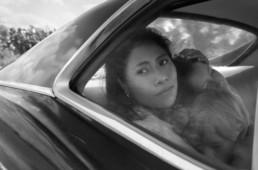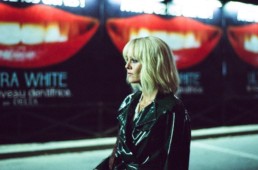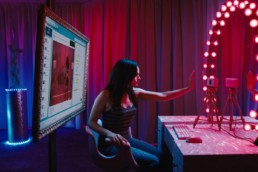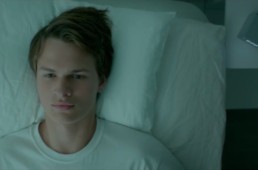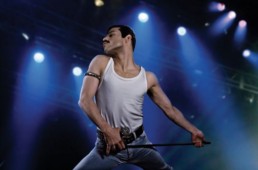'Roma' is a Mesmerizing, Monochromatic Epic
They say to writers, "write what you know."
And what Mexican filmmaker Alfonso Cuarón knows, beyond having made such mesmerizing films that have taken place in the outer limits of space as well as pure magical fantasy, is the city in which he was raised in – Roma, México. Transporting us to his early childhood as a young boy using beautiful 65mm black and white photography, Roma is his most personal work to date: a delicate and sensitive tribute to his past and upbringing and those who raised him. Watching this film – which becomes available to stream on Netflix starting December 14th – he channels heartfelt and honest affection into this story and its characters. To know that the film is both so close to his heart and to see it unfold on the big screen is a majestic thing that should be seen however it can be.
Set in the 1970s, Roma is a testament to the power of female figures as we see the stories of the women who raised him amidst intense hardship. Quiet and demure, the young housemaid Cleo (Yalitza Aparicio) may seem like an unlikely protagonist to base a film around, but we see that she is the silent heart and backbone of this middle-class family that she works for. We see her going about her daily duties – making the family's meals, picking the children up from school, and caring for the family dog, Borras, whose doggy doo-doo litters the driveway day in and day out. Cleo's maternal love makes the kids feel loved despite the tension-filled drama between their parents and her own personal struggles.
...it's because of the nuances of these directorial choices that we have the masterpiece we do.
Though she is quiet, Cleo is such a strong character, experiencing intimacy with a man (Jorge Antonio Guerrero) followed by his sudden departure, remaining resilient and compassionate to her family all the time. She learns valuable lessons throughout her coming-of-age journey that consists of emotional peaks and valleys, but all things push her toward self-love, acceptance, and independence. She comes to realize that life goes on, even when it feels impossible.
Cuarón, who also wrote and edited the film, had a very specific vision of what he wanted Roma to be. Roma is a somewhat unconventional film in that there is no score to speak of, where the intricate sound design and background music from the town's marching band fills the theater with rich audio. Multiple scenes are shot in a single take, lasting minutes long, weaving and winding throughout the family's large house. And it's because of the nuances of these directorial choices that we have the masterpiece we do.
From the very beginning, Cuarón was guarded about the extent of who knew, as the actors, casting director, and various other crew members were never given a script, only being told what each scene would be comprised of on the day of the shoot. What made this method perhaps slightly easier was the decision to shoot the film in chronological order, which is yet another logistical challenge for the crew. Yalitza Aparicio, the lead actress, auditioned for the role of Cleo on a whim (before beginning her first year as a teacher) without even knowing who Alfonso Cuarón was. Unbelievably, Roma is her very first acting job, and the only rule given by Cuarón was to "not look directly into the camera." This trust in his actors translates from the screen- Aparicio is transfixing and her performance is filled with so much genuine sensitivity that no trained professional could ever emulate.
One magical thing to watch for: water is symbolic for purity and fertility, and Roma plays to this motif quite literally as varying versions of water are "sprinkled" throughout the film: there is the intense hail, the crashing ocean waves, the unexpected water breaking as Cleo goes into labor, and the infamous one-take opening shot of washing stones. Now, I don't mean to deflate any dreams for those of you waiting to hear about the "infamous" and "mind-blowing" 4-minute opening shot, but it was a bit of a disappointment for me. I only say this because the titles run over most of the shot, making it not as meditative or awe-inducing as I expected. In fact, the distraction of the text does a disservice to a very beautifully-intended moment. The water also brings up the theme of reflection, both literally and figuratively. The reflection from the sky above fills the puddles of water on the stones, and the ocean's water forces Cleo to reflect on her life.
I was fortunate enough to see Roma followed by an incredible and intimate Q&A with select cast and crew, and so I speak from experience when I say you MUST see this film on the big screen. Alfonso Cuarón's masterpiece is a transformative and riveting stunner, inspired by Cuarón's own childhood. The film will have a divisive limited theatrical run in mid-December followed by it's Netflix release, but if you're able to catch Roma in theaters, then I highly, highly recommend that you do.
'Roma' is rated R for graphic nudity, some disturbing images, and language. 135 minutes.
'The Favourite': A Tangled Royal Triangle
Jockeying for power meets mad-cap mayhem in visionary director Yorgos Lanthimos's latest film, the absurd period piece comedy The Favourite.
For the audiences who have seen Lanthimos's previous films – The Lobster and The Killing of a Sacred Deer, – fans will recognize the unconventional relationships at play that he spins so wickedly, but this time done so humorously. Focusing on the behind-the-scenes politicking during the reign of Queen Anne in 18th century England, the possibility of war with France puts the entire country on edge. But that threat doesn't compare to a new enemy born inside the royal castles walls when the arrival of a cousin to the Queen's right-hand woman finds herself vying for the Queen's attention – and with that, a rise to power. With his rich visual aesthetic and sharp-witted flare, Lanthimos, – like our dueling cousins – pulls out all the stops to make The Favourite hilariously unforgettable.
Anne (Olivia Colman) is many things: an emotionally unstable matriarch, a "crazy bunny lady," and the Queen of England (and tantrums). Her flighty nature is only kept in check by her best friend and confidante, Lady Sarah (Rachel Weisz). Their dynamic is tested when Lady Sarah's cousin, Abigail (Emma Stone), arrives at the palace, in search for employment. A hesitant Sarah eventually recruits Abigail to join her as her chambermaid, in what might be a deadly mistake, as a slow test to win the Queen's affection begins to simmer. Behind Abigail's doe-eyes and vulnerable demeanor is a devious and emotionally savvy woman who is willing to do whatever it takes to be the Queen's right-hand woman.
An apt comparison of female power dynamics might very well be the high school satire Mean Girls, The Favorite being an 18th-
Lanthimos relies on two of his previous leading ladies to take the helm here: Olivia Colman, who played The Lobster's hotel manager and Rachel Weisz, who played opposite Colin Farrell in the same film, have an incredible back and forth that is as quick-witted and sharp as a ping-pong match. Emma Stone, the only non-British actor, puts her impeccable comedic sensibilities on display in both her physical performance and over-exaggerated line delivery. It's a trio of brilliant performances from Colman, Weisz, and Stone only made stronger by the supporting cast which includes Nicholas Hoult as the aristocrat Harley and Joe Alwyn as Abigail's royal suitor, Masham.
Behind the lens, cinematographer Robbie Ryan (American Honey, I, Daniel Blake) used unconventional camera techniques that at times reminded me of a music video. Most of the film is shot up from below, a low angle that frames us looking up at the characters that suggest an imbalance in the hierarchy of this royalty compared to the non-elite class – the audience. Whip pans, dolly shots, and the liberal use of the super wide-angle lens make the world of The Favourite feel like a fairytale, a world unique only to Yorgos Lanthimos (who also edited the film).
Yorgos Lanthimos has such a gifted way of creating fantastically surreal moments set in everyday life, and The Favourite continues this execution. In this case, everyday life is 18th century England but unlike his previous films, The Favourite is loosely based on historical fact. It remains self-aware, calling out Hoult's over the top hair and makeup in a hilariously demeaning fashion.
Although it doesn't quite surpass my all-time favorite – The Lobster – there is so much to love in this macabre dark comedy and is, without a doubt, another shining addition to Lanthimos's films. As Lady Sarah tells Queen Anne over and over again, "Love knows no limits" and true as those words are, there is no limit to my love for this film, making The Favourite one of my favorite films of the year.
'The Favourite' is rated R for strong sexual content, nudity, and language. 119 minutes. Opening this Friday
Livi Zheng: "I wanted to be in charge of the story"
Twenty-nine-year-old Livi Zheng should be proud.
Her latest film, Bali: Beats of Paradise, premiered to a packed house at the Academy of Motion Picture Arts and Sciences last week for its world premiere screening. With so many high-power individuals in the audience, including the Consulate General of Malaysia, diplomats from Bolivia, Kenya, Thailand, Myanmar, and the UCLA Chancellor Gene D. Block, it was clear that Bali: Beats of Paradise, which is a beautiful blend of sound and color, has worldwide appeal. In our exclusive interview, we talk about her career jump from a stunt woman to a director and celebrate her hometown opening its very first movie theatre. We begin:
Introducing Gamelan Music to the West.
Unless you're a composer or studying Gamelan music, you wouldn't really know about it. That's why I wanted to make this film in the first place.
As an Indonesian, I knew a little about Gamelan but its history isn't taught in school. You'll hear it at weddings, celebrations, and things like that. Indonesia has over 17,000 islands with all different types of dialects, so it's very rich in culture. I come from East Java, so going to Bali was a totally different experience for me. If you're Balinese, you cannot live your life without Gamelan music. When you're born, when you become a teenager, when you get married, and even when you pass away, Galeman is present.
Courtesy of Inzonesia
Going from stunt woman to director.
I've always done martial arts since I was young, and at 15-years-old I studied at the same school in Beijing as at Jet Lee. I always had an interest in film, so I started to get work as a stunt woman, but I realized that I wanted to be a director so I could be in charge of the story. As a stuntwoman, it was really fun but you're always hired to [tell] someone else's story. I wanted to do something about that.
I went to the U.S. for school and studied economy. I thought that would be a good foundation, but I still wanted to be on film sets. I started working on student films as a director, production designer, costumes, anything! Anything to understand the industry better.
Her hometown opened its first movie theatre this year.
My whole family comes from a small city, and we didn't have a movie theatre there until this year. So moviemaking wasn't really a career there. Indonesia is the 4th largest country in the world and we don't have many movie theaters. We maybe have 1,000, and in the U.S. it's closer to 40,000.
The road to success wasn't easy.
Growing up, I didn't have any mentors or anybody I could ask for help. So [when I started], it was just me and my brother. My brother and I wanted to make a film- at the time, of course, not knowing how hard it is haha. So we planned to shoot our film, Brush With Danger, with just three people, borrowing my friend's camera, you know? Also, the family of a friend of mine owns a bunch of restaurants so we were fed for free. What else do you need? Haha. I was determined to shoot it with or without a budget, I didn't want to wait for [the money]. After that, we started getting help from people, and more funding. I hadn't done anything prior to that, I had no other films on my resume, but it all [came together]. It got distributed internationally and I've been making movies ever since.
Courtesy of Buletin Dewata
Bali is a cultural mecca.
Bali culture is very interesting, their sense of community is very strong. You're expected to contribute. So if there is an event, you're expected to contribute in some way- whether that's playing Gamelan, preparing food or preparing offering or decorations. Like Nyoman Wenten, who lives in the U.S., he still contributes to his community. Anytime he's back [in Indonesia], he'll play Gamelan.
When we were filming Bali: Beats of Paradise, I told my crew that we needed to stay with the locals. We can't be staying in a hotel in a touristy area while trying to make a documentary about Balinese Gamelan. The whole place is super artistic- from the architecture to what people wear- it's fascinating. Even as an Indonesian, it was fascinating.
'Bali: Beats of Paradise' is now playing at the Laemmle Theatre Music Hall.
'Knife+Heart' Review: Psycho Killer
Vanessa Paradis stars as a lovesick porn producer in the 1970's set slasher film, Knife+Heart.
This bold entry, which screened in the Midnight section of the AFI Film Festival, is fueled by burning sensations and taboo promiscuity, creating a very specific je ne sais quoi quality that, after watching, will be impossible to forget.
There is a killer madman on the loose in Paris and he is targeting men in the porn industry. Actors are brutally and mysteriously getting killed off one by one. Aware of the growing threat but determined to continue making movies, Anne (Paradis) throws herself into her work. She scours the streets for common folk to bring into the industry, finding one promising boy on a construction site and gets inspired all over again. With her film company in jeopardy due to the evolving porn industry and posed threat to the actor's safety, Anne seeks comfort from her former lover and the company's editor, Loïs (Kate Moran). When her pleas for love go unreturned, Anne faces the harsh truth that it is every man (and woman) for themselves in these trying times.
From here, Knife+Heart continues down the path of an erotic psychosexual thriller film. Abhorrently graphic and violent from start to finish, French director Yann Gonzalez is relentless in creating a palpable mood. This fantastical, unclassifiable film is not an easy watch by any means, but for those adventurous cinephiles looking for a film that "quenches all thirsts", I cautiously welcome you to watch. The biggest driving force that attracted me to seek out Knife+Heart in the first place is the soundtrack, composed by the French electronic group M83. Their synth-pop score fuels the film's heartbeat with an otherworldly sound that pays homage to the taboo films of the past.
Knife+Heart is definitely not a family film and would be a really awkward first date movie as well, you've been warned. Knife+Heart is planning a theatrical release in early 2019.
'Knife+Heart' is not rated. 110 minutes.
'Cam' Review: Revenge of the Sex Worker
There is perhaps no better platform to premiere a thriller about cam girls than AFI Fest's midnight slot.
On the night (or actually the early morning?) of its AFI Film Fest debut, director Daniel Goldhaber was shocked to see the theater near capacity with only a few empty seats remaining. Embracing the moment, he said, "This movie will never be seen by this many people in one room again." The audience burst out laughing- Goldhaber had just teed us up for a night of mayhem and mystery, but no amount of forewarning could have prepared us for what we were about to see.
From the producers of Get Out, Cam is a psychological thriller set in the underbelly of webcam pornography. Alice (Madeline Brewer) is a young and ambitious cam girl who is working her way through the ranks and will stop at nothing to reach the #1 slot. Every night, she sets up elaborate scenarios for her male-dominated audience and encourages them to tip her by acting out their cheekiest fantasies and fetishes. With her growing notoriety, people begin to take notice, and not necessarily in a good way. Not only is her career affecting her relationships with her brother Jordan (Devin Druid) and mom (Melora Walters), but her online cam account becomes suspiciously sabotaged overnight.
When Alice realizes that she has lost control of her account, livelihood, and status, her revenge is kicked into high gear. To make matters worse and very confusing, it looks as if the person behind the hacking is an exact replica of herself, and so begins the "mind-bending psychological thriller" aspect of the film. Determined to reclaim her identity and her ranking, Alice uses her skills from past webcam experiences to attempt to defeat this mysterious evil twin.
What is perhaps the most fascinating aspect of Cam is the fact that it was written by a former sex worker, Isa Mazzei. Cam marks Mazzei's first and only screenplay, and it's clear that this film has a serious and personal underlying message about the women who cam. The stigma of sex work may have somewhat decreased over time, but it is still considered a taboo topic and Mazzei sets out to dispell any false assumptions about these women. What Mazzei brings to the film is far from an exploitation of this profession- yes there is nudity, yes, it is provocative, but above all else, Cam gives the audience an opportunity to sympathize with a sex worker. We feel her pain and desperation and see the desire for basic wants and needs that every human being deserves. We root for her and want her to kick ass.
Cam is a technology-driven, women-empowering film that will push audiences past their comfort zone and into the very real lives of cam girls. It is informative, eye-opening, and will hopefully leave audiences with some aspect of appreciation for the people and professions that have been overlooked or regarded as "less than". All this packaged as a devilishly fun thrill ride makes Cam a film not to be missed.
'Cam' is not rated. 94 minutes. Streaming this Friday on Netflix, opening Friday, 11/23, at Arena Cinelounge.
'Jonathan' Review: Twin Terror
I wanted to catch Jonathan when it premiered at the Tribeca Film Festival earlier this year but unfortunately, my schedule conflicted.
From first looks, this moody sci-fi flick seemed right up my alley. Reminiscent of a Drake Doremus color palette with two actors that seemed highly compatible on screen, I was hoping Jonathan would get picked up by a distributor so I would have a chance to see it in theaters. Thankfully, Jonathan is having its big screen debut this Friday and I am very happy to say that it lived up to my expectation and months-long anticipation.
Like an episode of Black Mirror, Jonathan follows the titular character – Jonathan (Ansel Elgort), a handsome young man who shares a body with… his brother. Now, don't write this film off based on this premise of symbiotic multi-consciousness, because the "why" remains a mystery for about a third of the movie (and I'd hate to ruin the surprise, so just go along with it for now). The way in which his body is shared is quite interesting as well. There is a daytime Jonathan – who acts as our protagonist – and a nighttime Jonathan – or "John" – whom we never actually meet. They each take 12-hour shifts within the body, with Jonathan being conscious from 7 am to 7 pm and John awake from 7 pm to 7 am. Since they don’t share a brain – only a body – they communicate about the days and nights events through videotaped monologues, catching each other up on whose turn it is to do the laundry or informing what groceries have been purchased.
'Jonathan' is twisted sci-fi through and through...
Their routine, while absurd, works for them. That is until Jonathan realizes John has been lying and secretly dating a girl named Elena (Suki Waterhouse). For obvious reasons, romantic attachments are strictly against their rules, and after an argument (which lasts for a couple of days since they need time to watch their videotaped fights and then reply), John goes radio silent, “ghosting” Jonathan and not recording tapes. Lost and confused, daytime Jonathan doesn’t know who to turn to, who to trust, or what's going to happen next.
First-time feature director Bill Oliver does such a fantastic job of building the suspense in Jonathan's world without overcomplicating or rushing key plot points. A tricky aspect of suspenseful surrealism convinces the audience of the story's realism, no matter how outlandish the plot. Jonathan is twisted sci-fi through and through, and Oliver's patient unraveling of information, along with cinematographer Zach Kuperstein's grounding camerawork, and a hauntingly good score from the Blair Brothers (Green Room, Blue Ruin) make this mind-bending thriller a fun and worthwhile watch.
Jonathan serves a double dose of Ansel Elgort, which is sure to excite fans of the twenty-four-year-old Baby Driver star. Thankfully, his character is more than just eye-candy to entice girls to the theatre. Here, Elgort is (literally) embodying two different personalities and acting against himself on screen. It's quite the challenge, yet he pulls it off so well and with such control, even when his character is anything but stable.
Jonathan is daring and bold, a fine film all the way around. It is sure to satisfy fans of the science fiction genre in a gently challenging way, but even if symbiotic multi-consciousness isn't your thing, there's still much to admire in this little indie film that could.
'Jonathan' is not rated. 95 minutes. Opening this Friday at Arena Cinelounge and on VOD.
The 5 Things We're Looking Forward To At This Year's AFI Film Fest
It was a shock to hear that LA Film Festival, a place where Cinemacy has had so many great and unforgettable memories over the years, will not return next year.
While losing this platform to showcase indie film is a hard hit for LA's cinephiles and fans alike, we're fortunate that the AFI Film Fest has no signs of winding down. All eyes are on the festival, which starts tomorrow, and in anticipation of the event, we're highlighting the five things we’re most looking forward to. If you can’t make it out, be sure to follow Cinemacy as we cover the festival from start to finish on Instagram, Twitter, and Facebook!

Sally Field, Miles Teller, Rebecca Hall, and Adam Driver at the Indie Contender's Reception at AFI Fest 2016
Morgan's pick: Women in Film Roundtables
The roundtable discussions at the AFI Film Festival are always an enlightening and inspiring event, but this year's focus on Women in Film makes me so happy. Not only will there be a presentation by director Nina Menkes on female representation in cinema, but there will also be a panel dedicated to female film critics! This panel appeals to me for obvious reasons, with topics of conversation ranging from the state of film criticism and how media outlets, studios, and film festivals are working to increase representation among critics and journalists.

Shoplifters film still
Ryan's pick: This year's Cannes Film Fest Palm d'Or winner, Shoplifters
In the context of prestigious film festivals, we can always look to the Cannes Film Festival (bucket list destination) to point to cinematic accomplishment and excellence. Credit the power of AFI Fest for being able to land this year's Palm d'Or winner at the festival, Shoplifters. Other than the fact that this Japanese film won Cannes' highest award, I don't know much else about this drama centered around a band of misfit family members – which is enough to get me to check it out.

ROMA film still
Morgan's pick: Roma
This may be cheating as I was fortunate enough to see Roma last night (followed by an incredible and intimate Q&A with select cast and crew), but I speak from experience when I say you MUST see this film on the big screen. Alfonso Cuarón's latest masterpiece is a black and white Mexican epic centered around family, which was inspired by Cuarón's own childhood. The film will have a divisive limited theatrical run in mid-December followed by it's Netflix release, but if you're able to catch Roma at the AFI Film Fest, then I highly, highly recommend that you do.

Vox Lux film still
Ryan's pick: Girls rocking hard in Vox Lux and Her Smell
Count me in for any hard-rocking movies centered around rockstars. A pair of femme-punk fronted films are screening at this year's festival, and I'm excited to see Natalie Portman returning to the big screen as a national pop-star in Vox Lux, and Elizabeth Moss going punk rock with Her Smell. In a year where women's voices are being heard louder than before, I'm excited to see more films where ladies turn it up to eleven on the DGAF scale.

The Ballad of Buster Scruggs film still
Ryan's pick: Netflix's big screen debuts, The Ballad of Buster Scruggs and Roma
It might sound counter-intuitive, but among all of the films I'll be watching this upcoming week are ones that I'll eventually be able to stream on my couch before the end of the year. Netflix inserts itself into Awards season with two films made by some of the most accomplished working directors in the business today, and the fact that these cinema-purists have gotten into business with the streaming giant shows how far the movie landscape has changed. The Coen Brothers' screwball Hollywood satire Hail, Caesar! didn't particularly win me over but nonetheless, I anticipate every one of their films, and my newest must-see is The Ballad of Buster Scruggs (originally conceived as a mini-series for Netflix, but will be an anthology of Western stories). The other Netflix title that is among my most anticipated of the year is Alfonso Cuarón's Roma, which has been receiving rave reviews (see above) and will certainly kick start "Best Picture" conversations into high gear.
'Bohemian Rhapsody' Review: Queen Reigns Supreme
I wasn't born when Queen performed at the legendary Live Aid Benefit show in July of 1985.
I was barely three-years-old when frontman Freddie Mercury died from AIDs-related symptoms in 1991. But man, did I feel like I was experiencing the mesmerizing talent of the iconic glam rock superstar in person, with a front row seat to one of the greatest moments in musical history. It tested my physical self-control to not stand up and headbang while singing along to the songs I grew up listening to in my childhood (thanks to the many summers spent in Drama Camp where the director used them during pre-performance warm-ups). No, I wasn't alive when Queen reigned supreme, but seeing Bohemian Rhapsody in theaters was the next best thing.
Bryan Singer's musical biopic about the enigma Farrokh Bulsara aka Freddie Mercury is a colorful and whimsical dive into the life of a societal outcast who found confidence and compassion within his chosen family of musicians. As an Indian immigrant who suffered from physical and sexual insecurities, Mercury consciously suppressed his negativity by putting his undeniable talent front and center, and it didn't take long for people to notice. His vocal capabilities were a way to override his anxiety, as he quickly bonded with his Queen bandmates Brian May (Gwilym Lee), Roger Taylor (Ben Hardy), and John Deacon (Joe Mazzello). He became engaged to the lovely Mary (Lucy Boynton) and went on to have international acclaim with #1 hits, and too much money to know what to do with. Talk about Killer Queen.
'Bohemian Rhapsody' is a film for the optimists, the music lovers, and the champions of the world.
The band's musical style evolved from anthem rock to opera soliloquies to disco-inspired-dance beats to emotional ballads and beyond. Mixing these genres was intentional, as Queen always wrote and performed their songs with the audience in mind. They wanted to create music that made the audience feel like it belonged to them too, they wanted the audience to feel a part of the band. And the audience loved it. But despite seemingly having it all, Mercury was selfish, self-admittedly "hideous", and often alone. While his outward confidence continued to grow with the band's success, behind the curtain, his off-stage persona was still an isolated immigrant teenager who longed for authentic, personal connections. It's poignantly ironic that the film's beginning montage is "Somebody To Love" (which, like every other song, left me with chills).
Director Bryan Singer, who is best known for the X-Men series, portrays Freddie as a flawed but lovable man who may have been blinded by fame, yet throughout his journey of self-discovery, ultimately comes to a place of self-acceptance. Singer keeps the story moving along quite swiftly (my only criticism is at times, the journey seems a little too easy) but the most impressive feat is how mind-blowing the performances are, especially the concert footage in the last scene. From small stages at local bars to London's Wembley Stadium, Singer recreates the crowd's uncontrollable energy and transforms the audience's theater seats to stadium risers.
It's quite audacious to take on the role of such a well-known individual, and it's another feat to completely become him. Rami Malik nails Mercury's nuanced mannerisms with his flamboyant stage prancing and exaggerated over-bite (due to having 4 extra incisors that made his mouth much larger than most), while also respecting his internal emotional struggle. Malik is magnetic on screen and gives a performance that makes Bohemian Rhapsody what is it: bold, in your face, and unforgettable.
Queen was a band of misfits, and they were universally embraced because of their authenticity. It was their creative spirits and steadfast dedication to musical exploration and inventive storytelling, fronted by an enigmatic lead singer, that landed them on the top of the charts. Freddie Mercury left absolutely everything he had on the stage and fought till the end. A bittersweet account of a man who dared to be different, Bohemian Rhapsody is a film for the optimists, the music lovers, and the champions of the world.
PS- While this film should definitely be experienced in a theater with surround sound, I also recommend watching it again in the comfort of your own home so you can rock out with no judgment.
'Bohemian Rhapsody' is rated PG-13 for thematic elements, suggestive material, drug content, and language. 134 minutes. Now playing in theaters.

